A deep dive into the biblical significance of sop reveals hidden layers of betrayal, loyalty, and ancient customs, compelling us to uncover more.
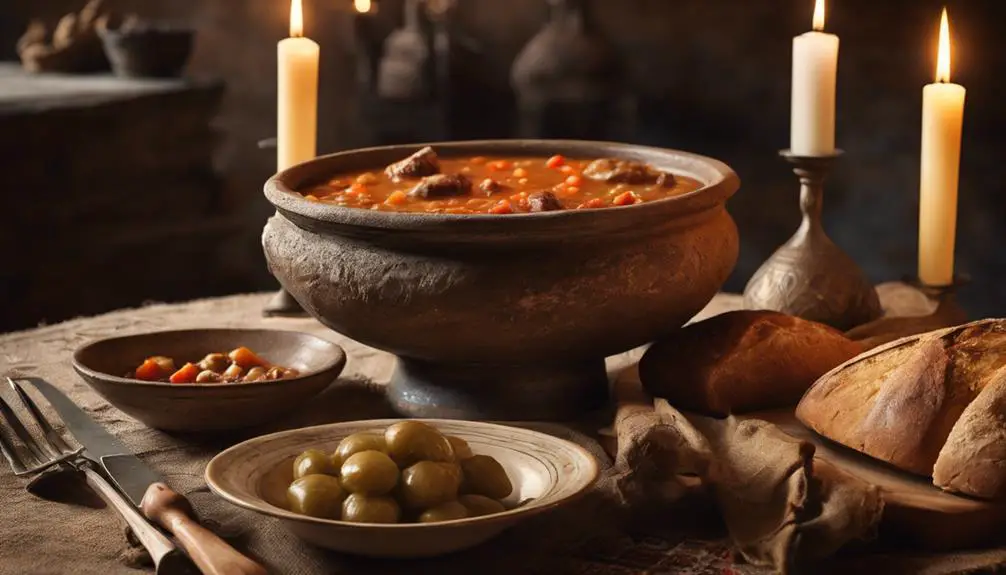
Sop in the Bible
As you walk through the dense forest of Biblical narratives, you'll stumble upon the concept of sop, an element as modest as a crumb yet packed with layers of symbolism and meaning.
This seemingly minor detail from the Last Supper holds a mirror to themes of betrayal and loyalty, intertwined with the cultural and historical fabric of the time.
By exploring the significance of sop, you not only uncover the intricacies of its symbolism but also how it reflects broader themes that resonate to this day.
Are you ready to uncover what lies beneath this unassuming morsel?
Key Takeaways
- Sop represents themes of betrayal and fellowship, deeply rooted in biblical narratives.
- Sharing a sop at the Last Supper symbolizes intimate betrayal, emphasizing mealtime customs.
- The act of offering sop carries ritual significance, reflecting ancient communal values and trust.
- Modern reinterpretations of sop explore contemporary themes while maintaining its symbolic essence in relationships and society.
The Biblical Significance of Sop

In the biblical context, the term 'sop' possesses significant symbolic weight, serving as a pivotal element in narratives that explore themes of betrayal and fellowship. Delving into sop origins reveals its roots in ancient dietary practices, where it was customary to dip bread or a piece of solid food into a liquid before eating. This act wasn't only a practical method for consuming food but also held deeper social and cultural significance.
You'll find that in ancient times, sharing a meal was a sign of trust and unity. The act of dipping bread into a common bowl and partaking of the same dish was a gesture of intimacy and fellowship. Thus, the sop transcends its physical form, embodying the values and customs of communal dining and the bonds it fosters among participants.
Moreover, the dietary practices surrounding sop highlight the simplicity and humility of ancient meals. Unlike today's abundant and varied diets, the food items involved in creating sop were basic yet nourishing, reflecting the everyday lives of the people. This simplicity adds another layer to its significance, underscoring themes of humility and shared human experience in biblical narratives.
Sop in the Last Supper
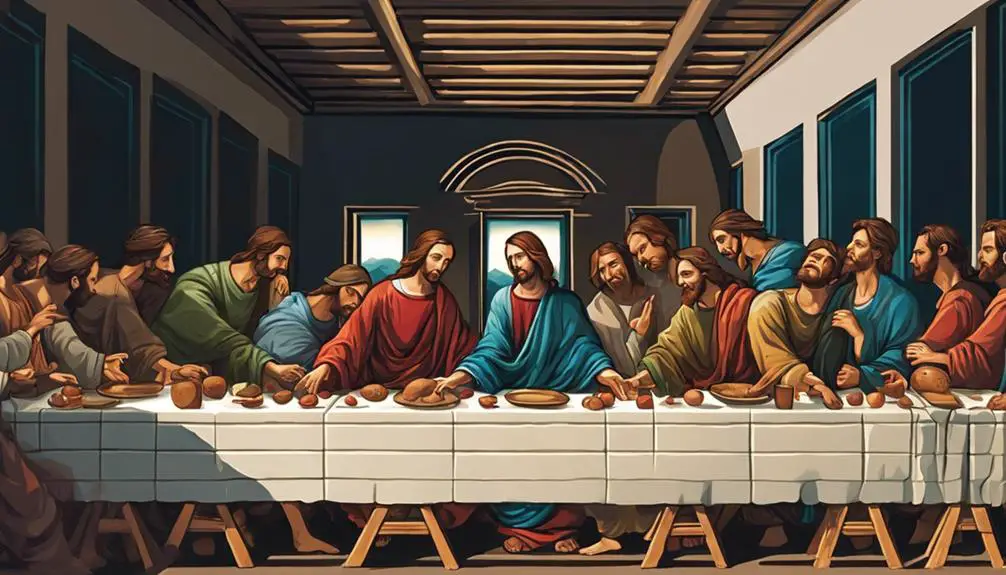
One of the most poignant instances of sop in the Bible occurs during the Last Supper, where it symbolizes betrayal within the sacred bounds of fellowship. This moment, deeply embedded in Christian tradition, highlights not only the intimacy of dining together but also the profound implications of meal etiquette in ancient times. You'll find that understanding the dining customs of the period brings a new layer of meaning to this narrative.
Aspect |
Description |
Significance |
|---|---|---|
Dining Customs |
Communal bowl, shared bread |
Unity and trust among participants |
Meal Etiquette |
Sop given as a sign of honor |
Betrayal marked by a gesture of closeness |
Historical Context |
Reclining at table, common in Roman and Jewish cultures |
Indicates a relaxed, intimate setting for significant conversations |
In this context, the act of Jesus dipping the bread and offering it to Judas Iscariot as a sop is laden with complex social and emotional cues. It's a stark reminder of the betrayal, made more poignant by the norms and expectations of mealtime fellowship. Understanding these customs and the etiquette of the time sheds light on the gravity of the act, beyond its immediate emotional impact.
Symbolism and Interpretation
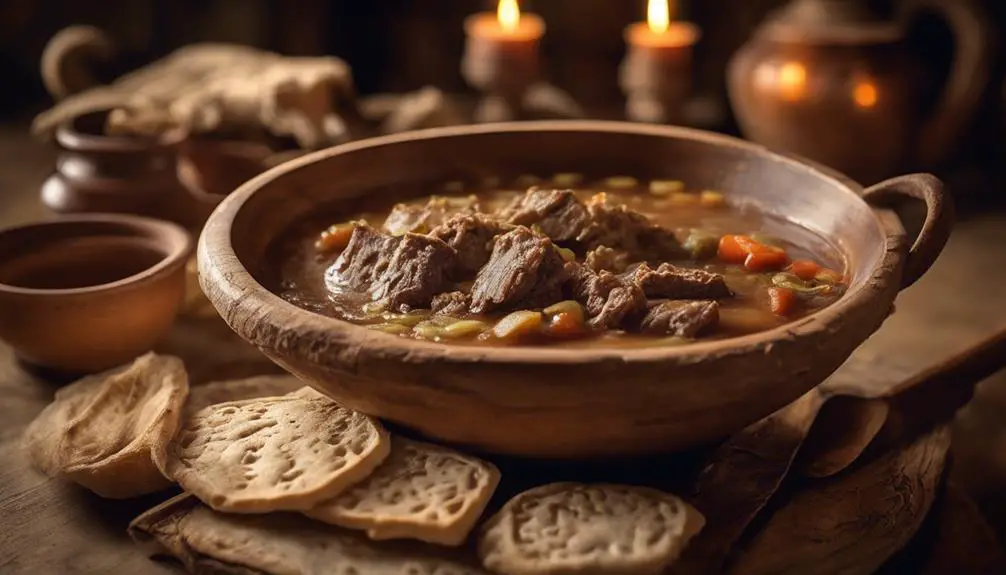
Delving into the symbolism and interpretation of the sop in biblical narratives requires us to examine the profound layers of meaning embedded in this seemingly simple act of sharing a meal. You'll find that the sop isn't just about the physical act of dipping bread into a dish; it's loaded with ritual meanings that transcend the immediate context. This act symbolizes a deep bond of fellowship and trust among those at the table, elevating the moment from a mere meal to an act of communal sharing and unity.
The ritual meanings behind the sop highlight an important aspect of communal living, where sharing food becomes a sacred act that cements relationships and underscores mutual commitment. In such a context, the offering of the sop to an individual could be seen as an act of honor or, conversely, as a powerful symbol of betrayal, depending on the narrative circumstances. This duality adds a rich layer of complexity to the interpretation of biblical texts, inviting you to ponder the multifaceted roles that rituals play in human interaction and spiritual communion.
Cultural and Historical Context
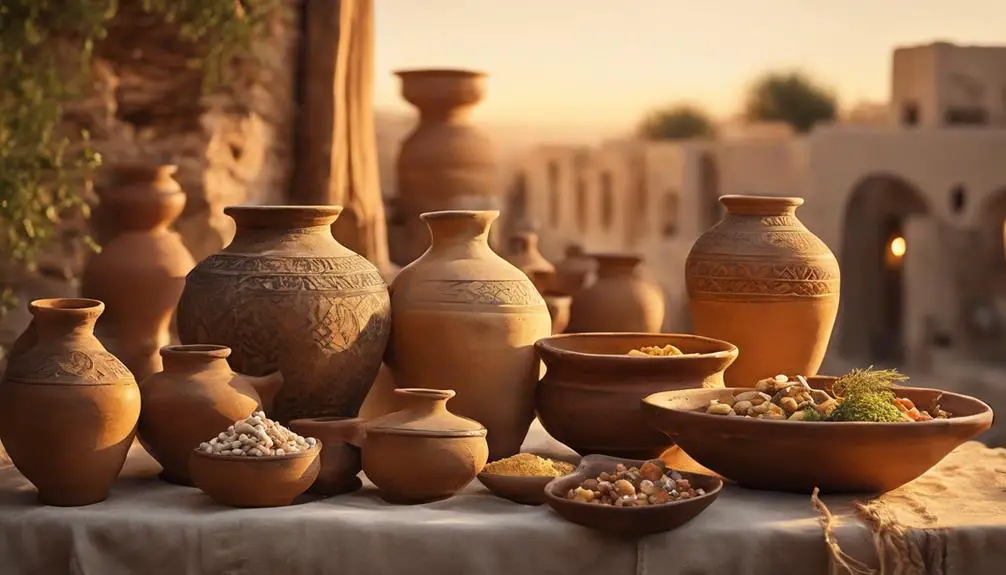
To fully appreciate the significance of the sop in biblical narratives, it's essential to explore its cultural and historical context. The sop, a piece of bread dipped in a dish, offers a window into ancient diets and feasting practices, illuminating the daily lives and traditions of the times. Ancient diets were predominantly plant-based, with meat being a luxury reserved for special occasions. This detail underscores the sop's role within communal meals, highlighting the communal aspect of eating and the sharing of resources.
Feasting practices in biblical times weren't just about sustenance; they were deeply symbolic events, woven with social, religious, and political significance. A feast could mark a covenant, celebrate a victory, or honor a guest. The act of sharing a sop, therefore, was more than a mere gesture of hospitality. It signified a bond between the host and the guest, underscoring themes of trust and fellowship inherent in these gatherings.
Understanding the cultural and historical backdrop of the sop provides insight into its symbolic weight in biblical stories. It's not just a detail of diet but a marker of social and religious practices, offering a richer understanding of the narratives in which it appears.
Betrayal and Loyalty Themes
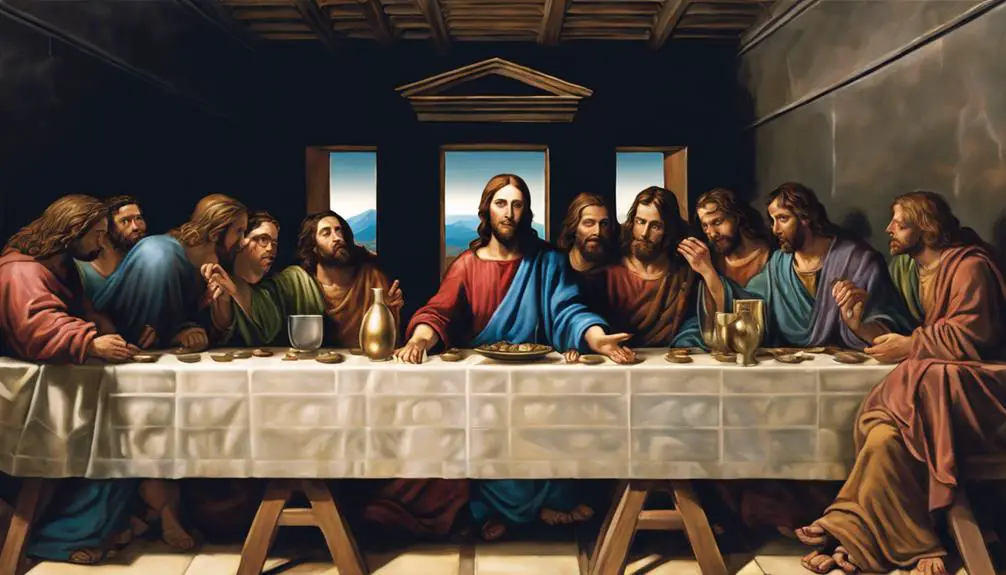
In exploring the sop's role in biblical narratives, it becomes evident that its usage poignantly underscores themes of betrayal and loyalty, serving as a critical element in the unfolding of these deeply human experiences. The moment when a sop is shared or offered can be symbolic, marking pivotal points in friendship dynamics and the erosion of trust. This gesture, simple yet profound, often preludes significant shifts in relationships, highlighting the fragile nature of human connections.
- The sop's offering in biblical stories often prefigures a moment of profound betrayal, spotlighting the complex interplay between trust and deceit.
- Through this lens, the sop becomes a metaphor for the breaking of spiritual and communal bonds, illustrating the consequences of trust erosion.
- Conversely, the acceptance of a sop can symbolize a moment of loyalty or covenant, underscoring the sacredness of commitments made in friendship dynamics.
- These narratives invite readers to reflect on the dualities of human nature, encouraging a deeper understanding of loyalty and betrayal's impact on interpersonal relationships.
Analyzing these themes through the biblical use of the sop illuminates the nuanced ways in which simple acts can carry profound meanings, shaping the course of human history and personal relationships alike.
Sop in Modern Reflections
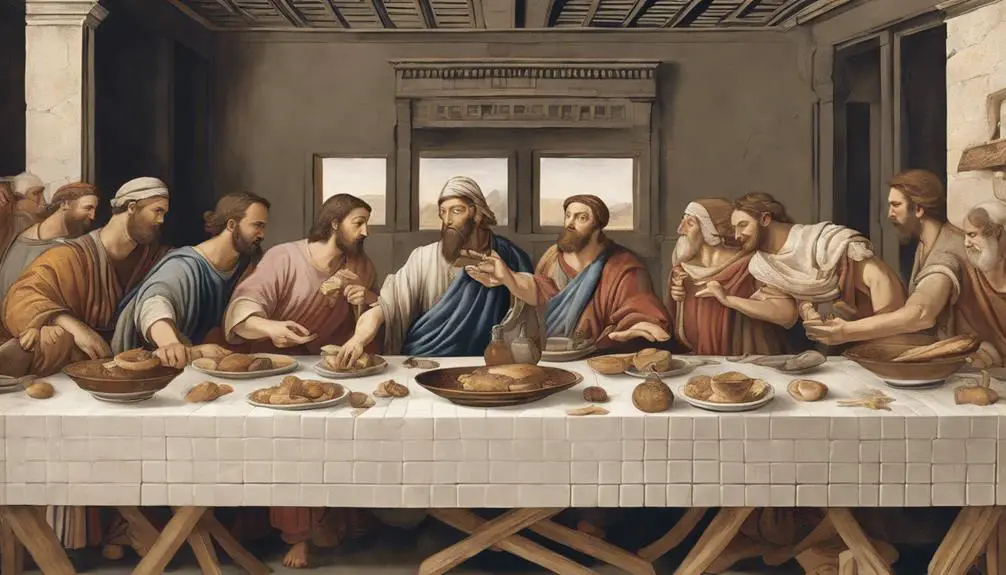
Reflecting on the sop's symbolism through a contemporary lens reveals its enduring relevance in discussions about human connection and morality. In today's world, where cultural exchanges are more prevalent, the sop serves as a poignant reminder of shared humanity through culinary traditions. It's fascinating to observe how contemporary adaptations of the sop in various cultures underscore its universal appeal and the timeless nature of its underlying messages.
Aspect |
Contemporary Reflection |
|---|---|
Culinary Traditions |
Modern cuisine often incorporates sop-like dishes as a nod to historical practices, blending flavors and stories from the past. |
Symbolic Meaning |
In literature and film, the sop symbolizes hospitality, betrayal, or redemption, mirroring its biblical roots. |
Contemporary Adaptations |
Chefs and artists reinterpret sop to reflect on current societal issues, fostering dialogue and understanding. |
Interpersonal Dynamics |
Today's communal dining experiences echo the sop's role in fostering connections, emphasizing the importance of shared meals. |
Frequently Asked Questions
How Does the Concept of "Sop" Vary Across Different Translations of the Bible?
You're diving into how the term 'sop' shifts across Bible translations, highlighting linguistic variations and cultural interpretations.
This exploration uncovers a rich tapestry of meanings, as translators adapt the concept to fit language nuances and contextual understanding.
It's not just about a word; it's an insight into how deeply culture and language intertwine, shaping our comprehension of sacred texts.
Your analysis reveals the complexities and sophistication behind seemingly simple terms.
Are There Any Specific Dietary or Health Implications Associated With the Types of Sop Mentioned in Biblical Times?
Diving into the heart of the matter, you're exploring the health and dietary implications tied to sop ingredients from a bygone era. These ancient concoctions, with their modern parallels, offer a window into past nutritional practices.
Analyzing them reveals a nuanced tapestry of dietary habits, where grains, herbs, and oils played pivotal roles. This scholarly journey uncovers the subtle shifts in dietary norms, reflecting broader cultural and environmental changes over millennia.
Can the Act of Sharing a Sop Be Found in Religious Texts Outside of the Christian Bible, and if So, How Is It Portrayed?
You'll find the act of sharing a sop in various religious texts, not just the Christian Bible. This act carries deep cultural symbolism across different faiths, often representing fellowship, betrayal, or purification.
Interfaith interpretations provide a rich tapestry of meanings, reflecting the diverse ways communities understand and value this gesture. Analyzing these instances, you'll discover the universal themes of hospitality and trust, alongside unique cultural nuances.
How Has the Representation of Sop Evolved in Visual Arts and Literature From the Medieval Period to the Modern Era?
Imagine you're on a journey through time, where the simple act of sharing a sop transforms into a rich tapestry of symbolism and interpretation.
From the stark, symbolic depictions in medieval art to the nuanced portrayals in modern literature, you've observed how sop symbolism has evolved.
Artistic interpretations have shifted, reflecting changing societal values and perspectives. This evolution showcases not just a meal's part but a mirror to humanity's soul through ages.
What Role Does Sop Play in Contemporary Religious Practices or Ceremonies Among Different Christian Denominations?
In contemporary religious practices, you'll find that sop symbolism varies significantly among Christian denominations, especially in Communion practices.
While some see it as a direct representation of biblical events, others view its role more abstractly, focusing on themes of unity and shared faith.
This diversity reflects the evolving interpretation and significance of religious symbols in modern worship, allowing for a richer, more personal engagement with the traditions and teachings of Christianity.
Conclusion
In navigating the textured layers of biblical narratives, you've unearthed the rich symbolism of sop—a humble morsel embodying profound themes of betrayal and loyalty.
Like a mirror reflecting the complexities of human nature, the sop at the Last Supper serves as a poignant reminder of our own moral crossroads.
As you reflect on this ancient motif, let it inspire a deeper examination of the intricacies within. In doing so, you'll find that the sop's significance transcends time, resonating within the tapestry of modern reflections.



Sign up